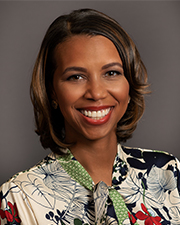Meet the new dean of education: LaTanya Love, MD

LaTanya Love, MD, associate professor of pediatrics and executive vice president of Student and University Affairs, recently was named dean of education at McGovern Medical School. Here she answers a few questions about her role and outlook on education.
Q: What are your short- and long-term goals for education at McGovern Medical School?
Anytime you start a new role, listening and learning are key. So, short term, I’ll be doing a lot of listening and learning from our students – what they love about their education here, and where we have room for improvement. I’ll also be listening to our faculty educators and learning about what works and what needs to be improved. Long term, I want to continue to train our next generation of physicians, giving them the best medical education possible. I want to MMS to be known nationally for our educational innovation. I want us to continue to meet the needs of different learning styles and avail ourselves of the educational technologies now available. No matter where they train and beyond, we want McGovern Medical School students to be recognized as well trained, compassionate, clinically knowledgeable, and providing the best care for their patients. I want us to leverage having the Texas Medical Center as the classroom for our students.
Q: You completed your residency at the Medical School and joined the faculty in 2005. How has the school changed over the years?
I’ve been here a long time – 22 years since I started my residency. I have seen McGovern Medical School change for the better. Our clinical, research, and educational footprints have expanded, and we are more present in the community. While we have experienced great growth, our heart and soul have remained constant. The camaraderie of our medical school family is strong, and there are some amazing faculty that I work with today who I had the privilege of being trained by.
Q: You have been a member of the Admissions Committee since you joined the McGovern faculty. What is your perspective on the students who join McGovern?
People may think I’m biased, but we have the best medical students. Our Admissions Committee does the best job being intentional and thoughtful, selecting and recruiting a diverse group of students with different perspectives and a variety of backgrounds and educational majors. Our students are amazing, and we are told that all of the time by those who interview here and those who train our students outside of McGovern. In addition to being smart, our students bring such a depth of perspective and wide variety of other interests outside of medicine, which ultimately makes them better doctors.
Q: What has driven your interest in medical education?
I come from a family of educators, and from the very start, I have always loved to teach. I can remember as a resident, grabbing a group of med students and doing a quick learning model on a patient we had seen. I’m really grateful to have an impact on training the next generation of future doctors, and I continue to learn from our students. The future of medicine is bright, and we will be in very good hands. It’s exciting to see the continual evolution of medical education.
Q: What was the best piece of professional advice you were ever given?
The advice I was given as young child, which was give to many of us, still resonates today: Treat others the way you would want to be treated. The Golden Rule was engrained in me by my parents and has carried over into my professional life. I’ve learned a lot from people with different roles and backgrounds, and it’s important when caring for patients that we model this for our students – treating each and every patient the way we would want to be treated.
Q: What advice would you/do you give incoming students?
I always tell them don’t sweat the small stuff. Medical school is certainly a lot of work and information, but use those study techniques that have brought you here. We want our med students to find a balance between working hard and studying and making the time to do things they enjoy. Medicine has a high burnout rate, and we care about our students’ well-being. You can’t take care of patients unless you take care of yourself first. It’s important to learn this as a student so this mindset will carry on in your career.
Q: How do you achieve work-life balance? What do you like to do in your spare time for fun?
Anybody who knows me well knows I spend a lot of time with my two teenagers, who are in 9th and 11th grades. They are both varsity athletes and on club travel teams – volleyball and basketball – so, I know every gym in the greater Houston area as well as most convention centers in the major cities. I love to cheer them on. When I am not working as a sideline coach, I absolutely love to travel the world and experience new cultures with my husband.